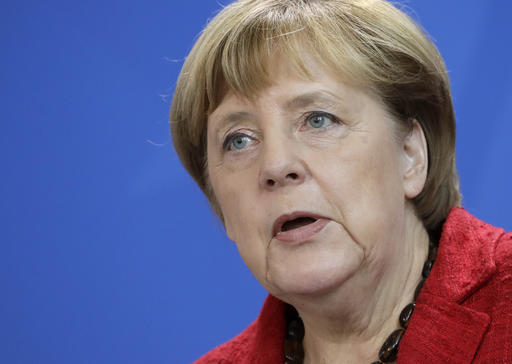BERLIN (AP) — Comments from Turkish President Recep Tayyip Erdogan and other Turkish officials accusing Germany of “Nazi practices” cannot be tolerated and need to stop, Chancellor Angela Merkel told Parliament on Thursday.
In her strongest comments so far about Erdogan’s statement, Merkel said the Nazi comparisons were “sad” and “so incredibly misplaced that one really can’t comment, but they cannot be justified.”
“We will not allow the victims of the Nazis to be trivialized,” she said. “These comparisons with the Nazis must stop.”
Erdogan made the comment on the weekend after several German municipalities canceled rallies that Turkish Cabinet ministers had planned to address in support of a national referendum to give the Turkish president more powers. Officials have cited problems with overcrowding and fire safety, and other issues
About 1.4 million people of Turkish descent living in Germany are eligible to vote in the referendum.
In a step back from the heated rhetoric of recent days, Turkish Prime Minister Binali Yildirim told reporters in Ankara Thursday that Germany seems to be taking sides in the upcoming referendum, but he did not repeat the Nazi comparison.
Asked about Merkel’s comments, Yildirim said Germany “may be disturbed” that a yes vote is likely in the referendum, but that if it is interfering in the process it amounts to “meddling” in another country’s affairs and is “very wrong.”
He told the AP that the way ahead “doesn’t lie in any more public statements that are made from one side or the other.”
“Rather Germany should take steps to get rid of the restrictions we are currently facing in terms of the access we have to millions of voters living in those countries,” he said.
Some rallies have gone ahead, and Merkel’s government has emphasized it wasn’t involved in blocking the others, but must respect the decisions of local authorities.
Even though irritation with the Turkish rhetoric has been increasing, Merkel defended that stance to critics in Parliament who have pushed for an outright ban on any Turkish campaigning in Germany.
“We do this on the basis of our values: Freedom of expression, freedom of the press, freedom of speech and freedom of assembly,” she said. “These values apply, and they also guide us when it comes to whether Turkish politicians can appear in our country.”
The strife comes at a time when the European Union is relying on a deal with Turkey that has significantly cut down the number of migrants crossing into Europe. Erdogan has several times threatened to quit the deal when expressing anger at the actions of European countries.
Germany also has reconnaissance aircraft based at a NATO base in Turkey in support of the fight against the Islamic State extremist group, a mission in which Turkey also plays a key role.
Merkel emphasized the need to balance those issues with the current problems, telling lawmakers it’s “an extremely difficult tightrope walk.”
“As difficult as everything is at the moment, and as unacceptable as some things are, it’s not in our foreign security or geopolitical interests that Turkey, still a NATO partner, becomes further distanced from us,” she told Parliament.
“We therefore need to work hard on the German-Turkish relationship, but on the basis of our values and our ideas.”
Adding to the recent tension has been Turkey’s arrest in February of German newspaper reporter Deniz Yucel, whom Erdogan has accused of being both a German spy and a “representative” of the outlawed Kurdish rebel group PKK.
Yucel, a reporter for Die Welt with German and Turkish citizenship, was detained in Istanbul over his reports about a hacker attack on the email account of the country’s energy minister.
Germany has dismissed Erdogan’s claims about Yucel as “absurd,” and Merkel told Parliament that the government is working “with all its means” to win Yucel’s freedom.
The first face-to-face meeting between German and Turkish officials in the wake of the recent diplomatic friction came Wednesday when Foreign Minister Sigmar Gabriel and Turkish Foreign Minister Mevlut Cavusoglu sat down over breakfast at a Berlin hotel.
Gabriel called the meeting “good, honest and friendly, but also hard and contentious” and the two sides agreed to meet again in Turkey.
___
Lederman reported from Ankara, Turkey. Kirsten Grieshaber in Berlin and Suzan Fraser in Ankara contributed to this report.
Copyright 2017 The Associated Press. All rights reserved. This material may not be published, broadcast, rewritten or redistributed.






